Politics
Earthquakes have frequently rattled Afghanistan, Pakistan in recent years
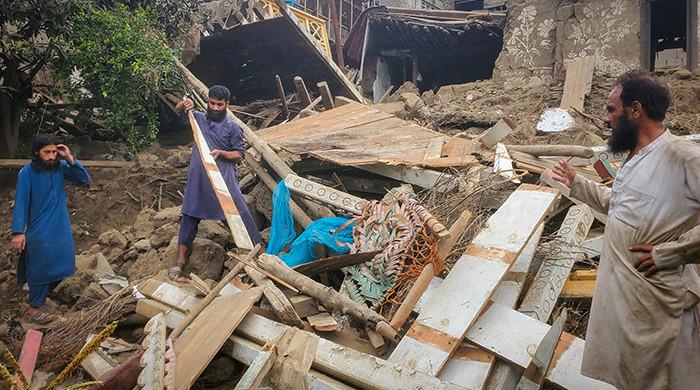
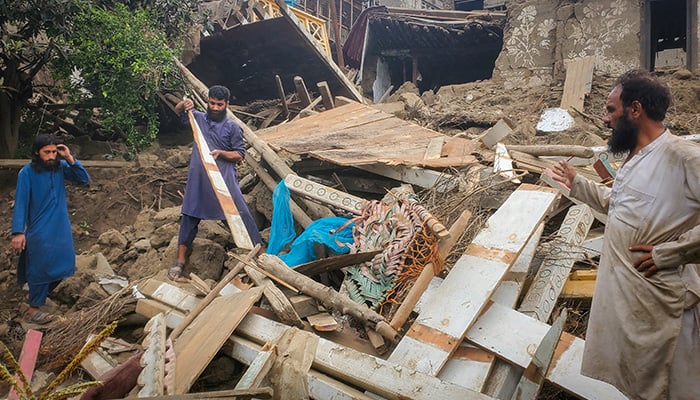
More than 800 people are dead and over 2,500 injured after an earthquake of magnitude 6 struck the rugged eastern region of Afghanistan, the region’s latest instance of increased seismic activity.
Here are previous such disasters of recent years in the Afghanistan-Pakistan region which lies at the intersection of the Indian and Eurasian tectonic plates.
2025
- A magnitude 5.6 quake hit Afghanistan’s Hindu Kush region on August 27.
- A magnitude 5.2 earthquake hit Afghanistan’s Hindu Kush region on August 19, at a depth of 186 km (115 miles).
- A magnitude 5.5 earthquake struck central Pakistan on June 29, with its epicentre at a depth of 149 km (93 miles).
- A magnitude 5.7 earthquake struck Pakistan on May 10, the European Mediterranean Seismological Centre said.
- Quakes of magnitude 5.6 and 5.8 hit the Hindu Kush and Afghanistan-Tajikistan border regions, on April 16 and 19, respectively.
- A magnitude 5 earthquake struck Pakistan on April 12, at a depth of 39 km (25 miles).
- Pakistan’s southern port city of Karachi has been hit by several moderate or minor tremors in March and June.
2024
- A magnitude 5.5 earthquake hit the Hindu Kush region in Afghanistan on October 17.
- An earthquake of magnitude 5.75 struck Pakistan at a depth of 10 km (6 miles) on September 11.
- Earthquakes of magnitude 5.5 and 5.8 struck Pakistan between March 19 and March 20.
- An earthquake of magnitude 5.5 hit northwestern Kashmir on February 19.
- A magnitude 6.3 earthquake hit the Hindu Kush region in Afghanistan on January 11.
- A magnitude 5 earthquake hit the Afghanistan-Tajikistan border region on January 5.
2023
- An earthquake of magnitude 5.3 hit the Afghanistan-Tajikistan border region on November 15.
- Many died as multiple earthquakes rattled Afghanistan in October.
- On August 6, an earthquake of magnitude 5.1 hit the Afghanistan-Tajikistan border.
- Earthquakes of magnitude 5.6 and 5.7 hit the Hindu Kush region in Afghanistan on May 3 and on August 5, respectively.
- An earthquake of magnitude 6.5 hit northern Afghanistan in late March, killing at least 13.
- A magnitude 5.8 earthquake hit the Hindu Kush region in Afghanistan on January 5.
2022
- An earthquake of magnitude 4.3 hit southeastern Afghanistan on December 16.
- Over September 5 and 6, at least two earthquakes struck Afghanistan, with one killing at least eight.
- A magnitude 5.6 quake struck Pakistan’s southwestern region on August 1.
- A magnitude 6 earthquake in Afghanistan killed more than 1,000 people in June.
- A magnitude 5.7 earthquake struck the Hindu Kush region in Afghanistan on February 5.
- An earthquake of magnitude 5.6, at a depth of 30 km (19 miles), hit western Afghanistan on January 17.
2021
- At least 15 people were killed after an earthquake struck southern Pakistan on October 7.
- A magnitude 4.6 earthquake, at a depth of 17.6 km (11 miles), shook Afghanistan on May 19.
Politics
World reacts to martyrdom of Iran’s Supreme Leader Khamenei
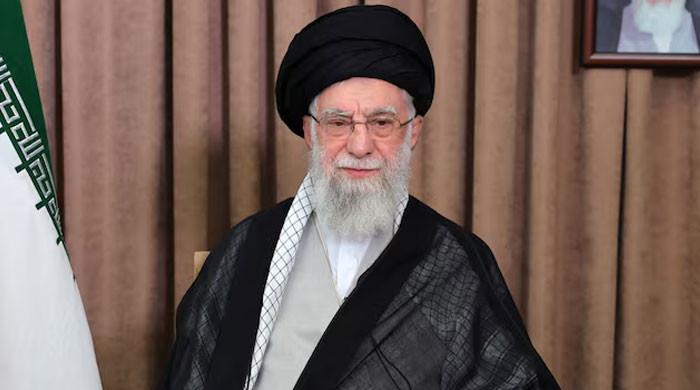
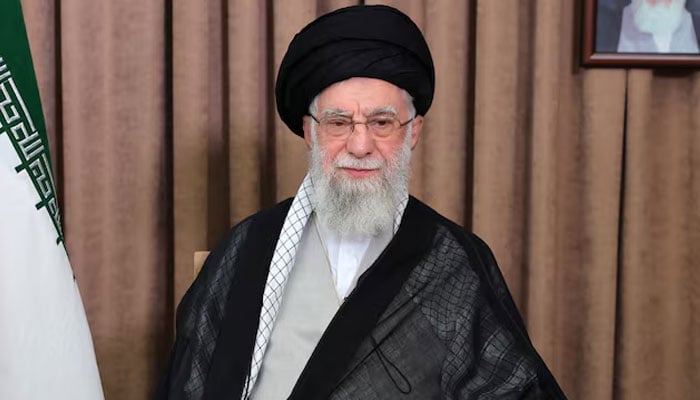
Iran’s Supreme Leader Ayatollah Ali Khamenei was martyred in US and Israeli strikes, state media confirmed, as another wave of attacks hit the country on Sunday.
Several countries, global bodies and prominent groups responded to the assassination of Iran’s supreme leader, urging de-escalation.
Pakistan
Prime Minister Shehbaz Sharif on Sunday denounced the targeting of Iran’s supreme leader in joint strikes by the United States and Israel, saying such actions were a “violation of the norms of international law”.
In a post on X, PM Shehbaz said that it was an age-old convention that the heads of state or government should not be targeted.
“Pakistan also expresses concern over the violation of the norms of international law. It is an age-old convention that the heads of state/government should not be targeted.”
Russia
President Vladimir Putin described Khamenei’s killing as a “cynical murder” that violated “all standards of human morality and international law”.
“Please accept my deep condolences in connection with the murder of the Supreme Leader of the Islamic Republic of Iran, Seyed Ali Khamenei, and members of his family, committed in cynical violation of all norms of human morality and international law.”
China
China said it “strongly condemns” the United States and Israel’s assassination of Iran’s Supreme Leader Ayatollah Ali Khamenei, calling again for a halt to military actions.
The assassination was “a serious violation of Iran’s sovereignty and security, a trampling on the aims and principles of the UN Charter and the basic norms of international relations”, Beijing’s foreign ministry said in a statement.
“China firmly opposes and strongly condemns this,” it added, calling for an “immediate halting of military operations”.
Malaysia
Malaysian Prime Minister Anwar Ibrahim on Sunday “unreservedly” condemned the killing of Iran’s Supreme Leader Ali Khamenei.
“I unreservedly condemn the killing of Iranian Supreme Leader Ali Khamenei. This act places the Middle East on the edge of grave and sustained instability. I extend my condolences to the Islamic Republic of Iran and to the Iranian people at this profoundly difficult momen,” wrote
Indonesia’s Ulema Muslim Clerical Council
“The Indonesian Ulema Council (MUI) expressed its deepest condolences for the death of Iran’s Supreme Leader, Ali Khamenei, as a result of the Israeli-American attack on February 28.
“The United States, which is playing a central role in managing the Palestinian conflict through the BoP (Board of Peace), faces a major question: is this strategy truly aimed at a just peace, or is it actually strengthening an unequal security architecture and burying Palestinian independence? Therefore, the MUI urges the Indonesian government to revoke its membership from the BoP.”
North Korea
North Korea condemned the US and Israeli strikes as an “illegal act of aggression”.
The attacks “constitute a thoroughly illegal act of aggression and the most vile form of violation of sovereignty in their nature”, a Ministry of Foreign Affairs spokesperson said, according to state media.
Iranian president
“The martyrdom of the Supreme Leader at the hands of Israel and the criminal America was a great disaster for our country… America and Israel should know that it will bring them nothing but embarrassment.”
Politics
IRGC Claims Missile Strikes on US Aircraft Carrier Amid Escalation


Iran’s Islamic Revolutionary Guard Corps (IRGC) on Sunday claimed it had launched ballistic missile strikes targeting a US aircraft carrier, identifying the vessel as the USS Abraham Lincoln, as part of what it called “Operation True Promise 4.”
In a statement, the IRGC’s public relations office said four ballistic missiles were fired at the carrier, adding that Iran’s military campaign had entered a “new phase.” The group warned that both land and sea would become the “burial place” for what it described as aggressors.
Multiple Waves of Strikes Announced
Earlier, the IRGC said it had launched the seventh and eighth waves of strikes under the same operation, in response to what it termed ongoing aggression by the United States and Israel.
Iran claimed it had carried out precision strikes on military targets in Israeli territory, including areas near Tel Aviv and Haifa. It also alleged that Israeli officials had taken shelter due to heightened security concerns.
Targets Across the Gulf
The IRGC further stated that it had targeted US-operated facilities in West Asia, including the US Fifth Fleet base in Bahrain, as well as installations in Qatar and the United Arab Emirates.
There has been no immediate confirmation from US or Israeli officials regarding the reported missile strikes or the extent of any damage.
Rising Regional Tensions
The developments mark a sharp escalation in regional tensions following reported military exchanges between Iran, Israel and US forces over the weekend.
Independent verification of the claims remains pending, and international observers have urged restraint amid fears of a broader conflict across the Middle East.
Politics
Key Iranian figures martyred in US-Israel military strikes
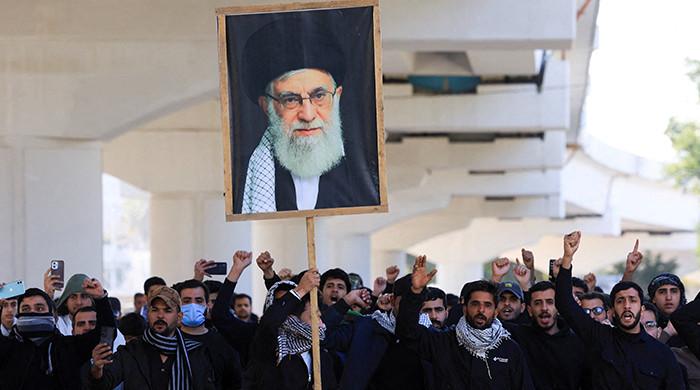
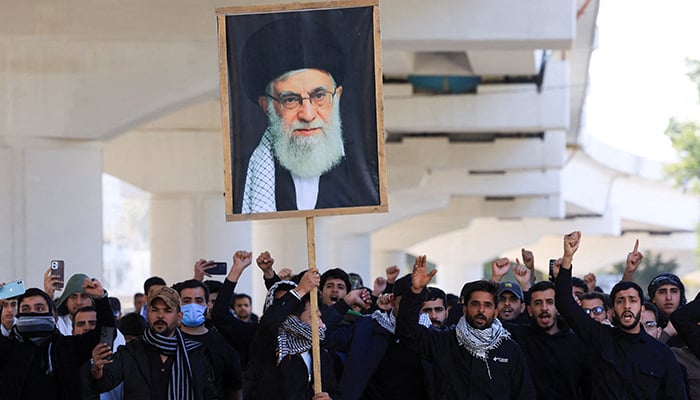
A number of Iranian senior leaders, including Supreme Leader Ayatollah Ali Khamenei, have embraced martyrdom in the “unprovoked and unwarranted” airstrikes by Israel and the United States.
As crowds gathered in Tehran, explosions rang out, and the Israeli military announced that it was again striking targets in the heart of the city — as more blasts were heard in Jerusalem, Riyadh, Dubai, Doha and Manama.
Iran’s President Masoud Pezeshkian declared Khamenei’s assassination a “declaration of war against Muslims” and warned: “Iran considers it its legitimate duty and right to avenge the perpetrators and masterminds of this historic crime.”
Iranian state media have confirmed the killing of several senior figures:
1. Ayatollah Ali Khamenei, supreme leader of Iran
2. Ali Shamkhani, representative of the Supreme Leader in the Supreme Defence Council
3. General Abdolrahim Mousavi, Iran’s Armed Forces chief of staff
4. Major General Mohammad Pakpour, commander-in-chief of the Islamic Revolution Guards Corps (IRGC)
5. Aziz Nasirzadeh, Minister of Defence
6. Gholamreza Rezaian, police intelligence chief of Iran
Separately, the daughter, son-in-law, and granddaughter of Ali Khamenei also embraced martyrdom in the US and Israeli airstrikes.
-

 Politics1 week ago
Politics1 week agoPakistan carries out precision strikes on seven militant hideouts in Afghanistan
-

 Business1 week ago
Business1 week agoEye-popping rise in one year: Betting on just gold and silver for long-term wealth creation? Think again! – The Times of India
-

 Sports1 week ago
Sports1 week agoKansas’ Darryn Peterson misses most of 2nd half with cramping
-

 Tech1 week ago
Tech1 week agoThese Cheap Noise-Cancelling Sony Headphones Are Even Cheaper Right Now
-

 Entertainment1 week ago
Entertainment1 week agoSaturday Sessions: Say She She performs "Under the Sun"
-

 Business1 week ago
Business1 week agoEquinox chairman says ‘health is the new luxury’ as wellness spending soars
-

 Sports1 week ago
Sports1 week agoHow James Milner broke Premier League’s appearances record
-

 Tech1 week ago
Tech1 week agoThe Supreme Court’s Tariff Ruling Won’t Bring Car Prices Back to Earth






